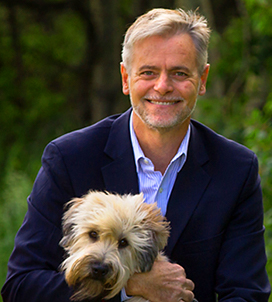Baker Institute welcomes new director
Baker Institute welcomes new director, Dr. Luis Schang
August 22, 2016
When he accepted the position as the next director of the Baker Institute for Animal Health, Dr. Luis M. Schang already had a tenured faculty position at one of Canada’s most prestigious universities, a thriving research program, and a fulfilling role in educating the next generation of scientists.
So why make the move to Cornell? Schang says that Cornell and the Institute inspire him.
“It took me five minutes at the interview to decide that’s where I wanted to be,” said Schang, who is currently a Professor of Biochemistry and Medical Immunology at the University of Alberta. “Also, I have been doing research for more than 25 years, and I can publish in journals, get patents, raise money, get grants, collaborate, and I can train people in the lab to be successful, but it’s becoming a bit of a routine. I’m looking forward to new challenges, to having an impact on more people.”
Schang will also assume directorship of the Cornell Feline Health Center, an organization within the College of Veterinary Medicine that provides cat health information to owners and veterinarians and funds research at the College. Schang will take over the role from Dr. Colin Parrish, Director since 2010.
When he starts his new position at Cornell in September, Schang brings with him his research program, which is focused on exploring the ways biologically active small chemicals affect viral replication.

“We look for molecules that have an impact on multiple viruses,” Schang says. “We use them as a way to test what the virus needs to replicate or what the virus does to cells.” This research is productive on two levels, says Schang: it answers fundamental questions about viruses at a very minute, detailed level, and it helps to usher potentially life-saving pharmaceuticals to market.
Schang calls this approach in the lab “discovery science”, a way of exploring scientific questions that delivers results that serve science, animals, and humanity in the near- and long-term. Schang rejects the dogmatic opposition of “basic” scientific research, which seeks knowledge for its own sake, and “applied” research, which seeks answers to serve a purpose, in favor of this concept of discovery science, which can fluidly accomplish both these objectives.
“I never liked the opposition of ‘basic’ to ‘applied’ – they’re not two separate processes. When we do science we are looking for the unknown, we don’t know what we are going to find. However, all along the process we think, how can it be useful?”
Schang brings this philosophy to the position at the Baker Institute, a veterinary research center with a long history of transformative discoveries, including breakthroughs in infectious disease and vaccines, reproduction, and genetics. In light of its past and current success, Schang says, he doesn’t expect any drastic changes will be needed upon assuming the directorship, but will seek to connect with the faculty, staff, and trainees in the Baker Institute and Feline Health Center and within the entire College of Veterinary Medicine to develop a vision for the future together.
“I don’t come to impose a vision; I come to develop a vision that we all agree upon and make happen,” says Schang. He says at this point in the Institute’s development, when research funding has become extremely competitive and state support is uncertain, it’s important that a new director from outside the Institute sees the challenges and opportunities with fresh eyes.
Like many of the current and former faculty members at the Institute, Schang has a veterinary degree, which he sees as an asset in biomedical research.
“I want to be involved in training veterinary researchers. Vets are perfectly trained in systems biology, and I want to do my part to help younger veterinary researchers to fully develop and reach their potential and bring out all what they have to offer,” says Schang.
This article also appears in the Cornell Chronicle.


